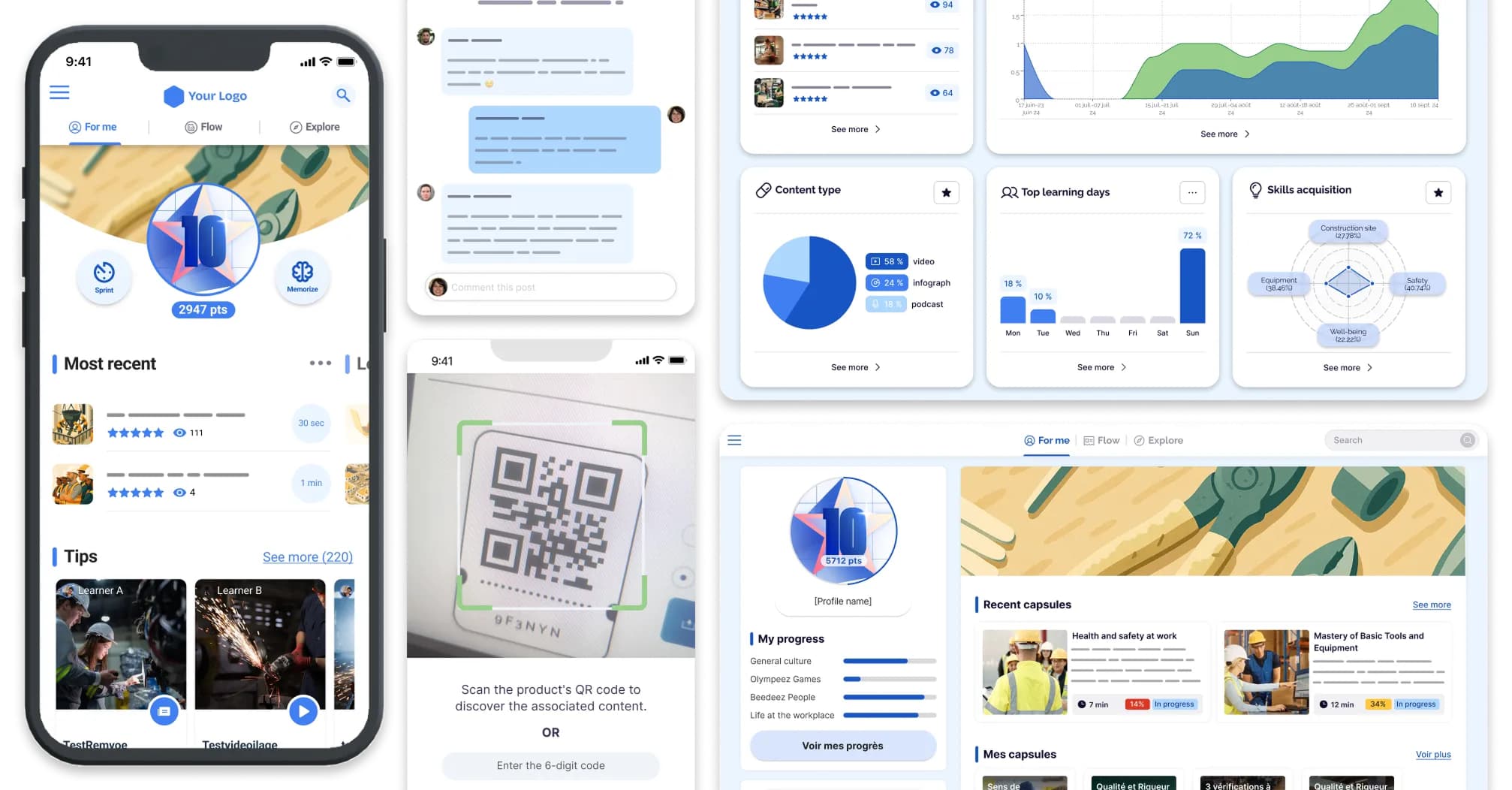The digitalization of training HACCP (Hazard Analysis and Critical Control Point) via an LMS is an ideal response to the challenges restaurant owners face in terms of compliance with health standards.
→ One LMS offers a flexible, fast and effective solution to provide food safety training, reduce training costs, and ensure flawless compliance during controls.
→ By adopting an LMS, restaurants are equipping themselves with a strategic tool to strengthen their performance and protect their reputation. 🌟
Decryption
HACCP training in the catering sector represents a major challenge to guarantee food safety and meet regulatory requirements. However, this task is far from simple, in particular because of the difficulties in organizing face-to-face training and the logistical constraints associated with teams in the field.
→ The use of a Learning Management System (LMS) responds effectively to these challenges by transforming the management of HACCP training.
- Accessible at any time : An LMS allows teams to follow online training courses, which avoids interruptions in daily work and optimizes skills development.
- Real-time update : Training content can be quickly updated to reflect the latest HACCP standards, ensuring that employees are always up to date with developments.
- Automatic training monitoring : Thanks to automated reporting tools, restaurant owners can easily follow the training of their teams and provide the necessary evidence during regulatory inspections.
- Cost reduction : An LMS reduces expenses related to face-to-face training, and allows a better return on investment thanks to accessible training at a lower cost.
👉 The LMS thus transforms the management of HACCP training courses into a much more fluid, flexible and reliable process, bringing real added value in food safety management.
❓ HACCP (Hazard Analysis and Critical Control Point) It is a food safety management system that identifies, assesses, and controls biological, chemical, and physical hazards throughout the food chain.
→ It is based on seven key principles aimed at preventing risks to public health, from the production of raw materials to final consumption.
→ This framework is essential to ensure compliance with food hygiene regulations, protect consumers, and maintain the reputation of businesses in the restaurant sector.
What are the challenges for traditional HACCP training in catering?
The management of HACCP training in restaurants involves several major challenges, often due to the organization and rapid evolution of standards:
- Organizational difficulties : Regular training sessions are hampered by time constraints and staff turnover. In the restaurant industry, where teams change frequently and schedules vary, scheduling regular training can be a real headache.
- Content update : HACCP standards evolve regularly and require the constant adaptation of training programs. Restaurants struggle to keep their training content up to date, leading to the risk of outdated or incomplete training.
- Tracking and traceability : Ensuring accurate monitoring of the training provided is complex without an effective system. In a regulated context, it is essential to be able to prove that employees have completed the necessary training. This involves manually managing files, which is both time consuming and error-prone.
- Consequences of shortcomings : In the absence of rigorous monitoring, the consequences can be serious: health risks, regulatory sanctions, and attack on the repute of the establishment.
What are the direct benefits of digitalization with an LMS for HACCP training? 💡
La digitalization of HACCP training thanks to an LMS makes it possible to overcome these challenges while offering considerable advantages for restaurant owners:
- Permanent accessibility : An LMS makes training accessible 24 hours a day and 7 days a week, in a flexible way and adapted to the constraints of the teams. Employees can complete their training modules at their own pace, without disrupting their schedule or daily business activities.
- Instant update : The training content can be easily updated as soon as a new HACCP standard comes into force. In this way, all employees receive up-to-date training courses without delay and remain in compliance with the latest legal requirements.
- Optimized traceability : An LMS offers automated monitoring tools, making it possible to track the training courses taken, the certifications obtained, and the reminders necessary for renewals. You have reliable and complete documentation in hand, ready to be presented during regulatory checks.
- Cost reduction : By eliminating the need for face-to-face training and optimizing the management of training sessions, an LMS reduces operational costs associated with training, while increasing its efficiency. Fewer trips, less wasted time, more flexibility for teams.
What are the key LMS features to optimize HACCP training?
An LMS adapted to HACCP training offers several essential functionalities to guarantee the effectiveness of training and ensure their compliance:
- Interactive modules : Training courses must be engaging to ensure better information retention. Explanatory videos, assessment quizzes, and practical cases on good hygiene practices make it possible to engage employees and make learning more concrete.
- Mandatory courses adapted to roles : Each position in a restaurant requires specific knowledge of HACCP standards. An LMS allows you to create tailor-made courses for cooks, servers, managers and cleaning staff, according to their responsibilities.
- Automatic reminders : It is essential to renew HACCP certifications regularly. An LMS can send alerts to inform employees and managers of certification renewal dates, ensuring ongoing compliance.
- Reporting tools : A personalized dashboard makes it possible to monitor the progress of training courses for each member of the team and to generate detailed reports. These tools allow for complete documentation, necessary for inspections or audits.
These 5 statistics you need to know about the digitalization of training in the restaurant industry
64% of catering businesses find it difficult to train their employees on a regular basis due to time constraints and staff turnover.
78% of restaurant owners believe that a well-deployed LMS reduces the time spent on training management and improves the efficiency of learning.
85% of regulatory controls require tangible proof of the compliance of HACCP training courses. An LMS provides reports and certifications automatically, allowing you to prepare effectively. 📑
Restaurants that have digitized their HACCP training have reduced by 30% errors related to food hygiene thanks to better training management.
More than 40% of catering establishments indicate that updating HACCP training content remains a difficulty without a digitized system, as changes need to be applied quickly and consistently.
FAQS
Why choose an LMS to train my staff in HACCP standards rather than using traditional training?
An LMS offers flexibility that in-person training cannot match. It allows your teams to take training at their own pace, access content updated in real time, and prove compliance through automated monitoring, all while reducing the costs associated with organizing physical training.
Can the LMS be adapted to the different types of staff in my restaurant (cooks, servers, etc.)?
Yes, an LMS makes it possible to personalize training courses according to the role of each employee. Cooks, waiters, or managers can follow specific modules adapted to their functions, with reminders and evaluations relevant to each role.
How can an LMS help ensure HACCP compliance during inspections?
An LMS generates follow-up reports and training certificates, making it easy to prove the compliance of your staff during inspections. These documents are accessible in real time, ensuring total transparency and simplified compliance management.
Can I update the training content according to the new HACCP regulations?
Yes, an LMS allows you to update training content in a few clicks, ensuring that your teams are always trained according to the latest HACCP standards.
What are the advantages of an LMS for managing HACCP training costs?
An LMS significantly reduces the costs associated with face-to-face training, while optimizing time and resources. Fewer trips, less physical training and more flexibility make it possible to maximize the effectiveness of each training course.




